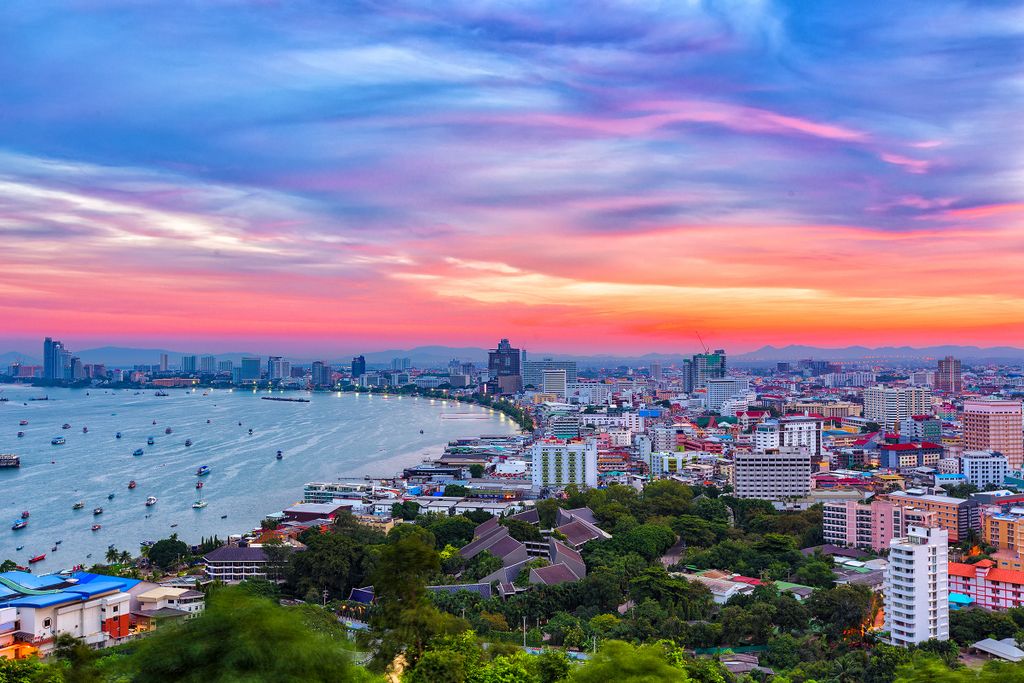Facts about the train from Bangkok to Pattaya
| Cheapest Train | $7 |
| Fastest Train | 2h 28m |
| Earliest Train | 6:45 AM |
| Latest Train | 6:45 AM |
| Daily Train Routes | 0 |
| Distance | 137 kilometers |
| Train | Thai Railway |

| Cheapest Train | $7 |
| Fastest Train | 2h 28m |
| Earliest Train | 6:45 AM |
| Latest Train | 6:45 AM |
| Daily Train Routes | 0 |
| Distance | 137 kilometers |
| Train | Thai Railway |
Taking a train to get from Bangkok to Pattaya is a safe, fast, and scenic option to travel the country. On certain routes, there are multiple train departures per day every 10 to 15 minutes. This is typical for intercity travel, while for long distance train routes there are fewer scheduled departures – plan ahead to choose the one that fits your itinerary best.
For long distance train journeys, we recommend reserving your tickets at least a few days ahead of your travel date. Buying train tickets via our online booking system will allow you to choose and reserve the best Bangkok to Pattaya tickets.
Buying your tickets online will help you secure the trip on the selected date and avoid queuing at the station.. When travelling on weekends and holidays it is recommended to reserve tickets much earlier due to a much higher demand. During high season, train tickets sell out quickly – do book as early as you can.
Travelling by train, the distance from Bangkok to Pattaya is 86 miles. Before setting on for a train journey, have a look at the map to find out what tourist spots or landmarks you will pass by – maybe they are worth a quick stop?
Travel time from Bangkok to Pattaya is estimated to be about 2h 28m. Trains ensure the fastest time to travel by land. As normally there is no congestion, the speed of travel is more or less constant and stops at train stations are rather short, train is almost always one of the quickest and safest ways to get from Bangkok and Pattaya.
The most important thing that may affect train travel time is the type of train. Ordinary trains travel at a speed of about 40 mph or 65 km/h to 65 mph or 105 km/h. Some intercity trains with shorter distances between stations run slower than 40 mph. Even with these low speeds, it can still be faster than commuting by car, bus or taxi.
The speed of express trains can reach up to 100 mph or 160 km/h. Modern high-speed trains can run at speeds exceeding 250 mph or 400 km/h.
These speeds of travel together with relatively short stops between stations can greatly shorten the duration of your trip.
The train ticket price from Bangkok to Pattaya varies depending on the types of trains or carriages available.
Some trains feature different types of carriages, seats and berths offering various amenities and level of comfort.
Basic passenger trains which are often non-air-conditioned and have wooden, hard or old seats are normally cheap. Premium or luxury trains and coaches have a higher ticket price but are equipped with air-conditioning, toilets, and large soft seats with sufficient legroom to make train rides comfortable.
Considering the distance travelled, train is the most affordable means of transport. Also, ticket prices include 2 or 3 bags – sometimes even more – per passenger.
Trains are great for long-distance travel. Double-check your travel itinerary and use the Bangkok to Pattaya timetable above with train departure times and arrival times to find the best train for your route.
Unlike buses or taxis which have numerous companies offering their services, train service is usually offered by just one major company in each country. As railway service requires a large amount of infrastructure, most railway companies are government-owned and are a part of the national transport system.
One of the best advantages of travelling by train is that railway stations are often conveniently located within or very near major cities and urban areas. Immediately on arrival to their destination, travellers find themselves in close proximity to important facilities like hotels, supermarkets, and hospitals.
If you travel with a lot of bags and luggage, trains are your best option. Luggage weight limits on trains are rather flexible and allow you to carry multiple bags with you.
Special or luxury trains feature sufficient legroom which allows you to stretch your legs and relax. In comfort and space these train seats can be compared to business class airplane seats.
Similar to buses, trains can provide a variety of amenities to make your travel more comfortable and enjoyable. Modern trains have WIFI service, a snack counter and a drinking bar. Onboard toilets can be a life saver for travellers with queasy stomachs.
Lastly, unlike buses and other overland means of transport, trains are very rarely involved in accidents.